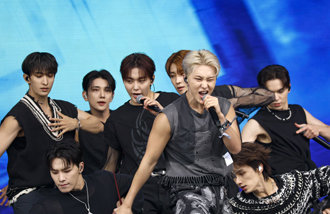Celebrity Stock Fever May Be Cooling
Celebrity Stock Fever May Be Cooling
Posted February. 22, 2006 04:32,
Actress Lee Young-ae returned with little fanfare on February 20 from the Berlin International Film Festival. But the scandal over Lee Young-ae Holdings has yet to reside.
The scandal broke when the KOSDAQ-listed company Nuvotec disclosed on February 7 that it planned to invest in Lee Young-ae Holdings, a company Lee plans to set up, and turn it into an affiliate by taking over its management. The declaration turned out to be unfounded, however.
Nuvotecs stock price, which had once risen as high as 21,500 won from the disclosure, has been plunging ever since the announcement was found out to be false, recently falling to near 10,000 won. Lee has sued Nuvotec management for libel as well as for violating securities trading laws, and minority shareholders who suffered losses are also preparing a collective lawsuit.
This was not the only company which saw violent fluctuations in its stock price due to the celebrity effect, however.
Greedy Investors Drive Stock Prices-
The stock market paid close attention to celebrities last year. Investors talked of actors and actresses such as Jang Dong-geon, Ha Ji-won, Jung Jun-ho and Kwon Sang-woo. Many individual investors flocked to buy the items they had invested in, causing those stocks to surge.
Celebrities mainly invested in entertainment stocks, which were popular theme stocks last year, along with biotech stocks.
Researcher Choi Young-suk at Samsung Securities said the reason for the phenomenon was high expectations for the Korean Wave and the diversifying media.
As movies, TV dramas, CDs and performing arts content can now be sold, not only in Korea, but also in global markets, people are anticipating a never-ending generation of profit. The diversification of media from free TV to Digital Multimedia Broadcasting, cable TV, and WiBro, the next-generation wireless Internet, helped drive those expectations even further.
But many doubt the actual benefits from the celebrity effect.
It makes no sense at all to expect a stock value to rise by just linking a celebrity with a firm that is not even showing business results, pointed out Daewoo Securities researcher Kim Chang-kwon.
Some hope that a celebrity holding shares in a certain stock will not only stop at bringing attention to the company and actually stand by it to the end, but this is a far cry from reality. Actress Ha Ji-won underwent a public prosecutors investigation a while ago on suspicions of manipulating the stock prices of Spectrum DVD. Last August when the price of the stock soared, Ha sold about half of her 11.67 percent stake that she had acquired in May.
Such incidents have even led to the criticism that celebrities are being used to manipulate stock prices.
Mature Investment Culture Needed More Than Regulation-
Experts agree that the scandals are a result of the inappropriate investment culture of Korean stock markets.
To raise their stock value, companies often involve themselves in theme stocks regardless of the reality of their businesses. An obvious example is how many KOSDAQ-listed firms saw their stock prices rise benefiting from the biotech theme, but disclosed that they had nothing to do with stem cells after the uproar about Hwang Woo-suks research.
Despite being aware of these problems, investors still make their moves based on their past experience that theme stocks make money.
The government is showing signs of taking belated action to regulate backdoor listing, which was the means behind the Lee Young-ae scandal.
It is also looking at ways to prohibit majority shareholders from selling their stocks within two years, not only when conducting mergers with weak corporations on the KOSDAQ market, but also in cases of stock swaps or business takeovers.
Kwak Sung-shin, the president of the KOSDAQ Market Division at the Korea Exchange, explained that the government is trying to reinforce regulations because some companies are abusing the backdoor listing rules that were eased in 2004 in order to boost venture businesses.
However, a mature investment culture is more urgently required than stronger regulations.
I dont know a great deal about economics, but I believe investors also must make more detailed, careful considerations before investing, said Lee in an interview.
Im-Sook Ha TK Sohn artemes@donga.com sohn@donga.com







